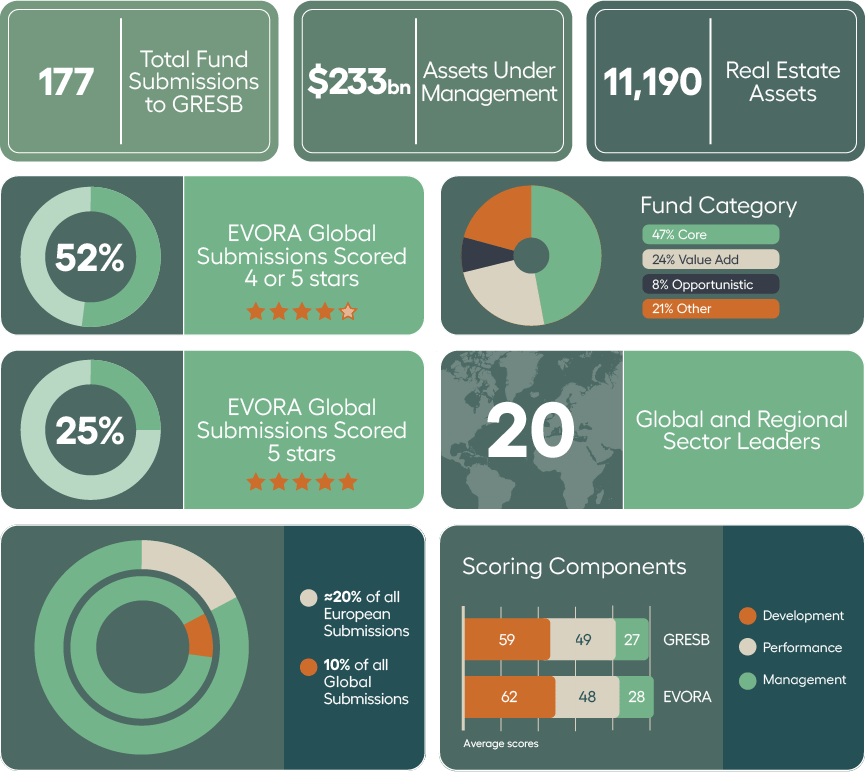
Get to Grips with GRESB
Address sustainability challenges with GRESB reporting to attract responsible investment.

GLOBAL REAL ESTATE SUSTAINABILITY BENCHMARK – GRESB
Embracing ESG: How EVORA Helps You
GRESB is more than just a benchmark – it’s a tool to drive investment, enhance asset value, and meet regulatory expectations.
EVORA has helped over 170 funds maximise their GRESB scores through expert guidance and data-driven insights.
Mitigate
Risk
EVORA identifies ESG risks early, ensuring compliance and resilience.
Protect
Asset Value
A GRESB submission with EVORA leads to optimised operations and better scores, attracting investment.
Safeguard Reputation
Our expertise helps you avoid reporting gaps that could impact investor confidence.

GRESB TIMELINE
Optimising GRESB Performance
with EVORA’s
Expert Support
GRESB is more than just a benchmark – it’s a tool to drive investment, enhance asset value, and meet regulatory expectations.
EVORA has helped over 170 funds maximise their GRESB scores through expert guidance and data-driven insights.

PROVEN RESULTS
Talking about
The EVORA Effect
In 2024, GRESB received reports from 2,223 real estate participants globally, 167 infrastructure funds and 720 infrastructure assets, representing almost $9tr in gross asset value (GAV).
Of these, EVORA supported 177 fund submissions, covering $233bn AUM. That’s approx 20% of submissions in Europe and 10% of submissions worldwide, of which 25% scored 5 stars and 52% 4 or 5 stars.
20 of the funds supported by EVORA have been recognised as Global and Regional Sector Leaders.
THE EVORA OFFERING
Providing a variety of packages to suit your needs
-
GRESB Gap Analysis
A comprehensive review of your asset/fund’s current position against GRESB survey requirements, helping you identify and implement targeted improvements for both Management and Performance components.
-
GRESB Performance Reporting Support
Use of our data management platform, SIERA, to aggregate and validate your GRESB data, with EVORA’s expert review to optimise your score.
-
GRESB Full Reporting Support
A comprehensive submission support program, covering materiality assessment, data collection, GRESB portal upload, results review, and an improvement roadmap presentation.
Our customers’ voices
SUBMITTING TO GRESB
Struggling with GRESB data collection?
We handle it.
Gathering data is a crucial part of the reporting process, and data availability plays a significant role in your GRESB score. The higher the percentage, the greater the potential score.
With the assistance of our experts and our own software, SIERA, EVORA helps streamline the process to ensure a successful GRESB score.

DATA COVERAGE
Facilitating Automated
Data Collection
With over 17 billion data points under management and a global network of data sources, EVORA offers one of the most comprehensive automated data collection solutions in the industry. We continuously integrate new utility providers and hubs, providing instant global access through automatic invoice parsing.
Our system processes incoming data continuously and automatically, while also collecting any historical data your buildings have generated over the years. This ensures a seamless setup, allowing you to start using our data collection services with minimal delay.
DIVE INTO THE DETAILS
Q&A
Below are some of the top questions we hear from real asset professionals. If you have any other questions, reach out and we’ll be happy to help.

GRESB 2025
Staying ahead of the curve
The upcoming 2025 GRESB standards is set to raise the bar on data verification, renewable energy procurement, and embodied carbon, especially for large entities and infrastructure assets.
EVORA helps you stay ahead by ensuring your data is audit-ready, aligned with the latest ESG methodologies, and supports enhanced transparency, stronger documentation, and adaptation to evolving standards.



















